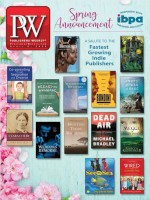From 2004 to 2018, Molly Wizenberg ran the popular food blog Orangette, and in that time she wrote two memoirs: A Homemade Life, which blended recipes with stories about her family, and Delancey, which chronicled the experience of opening a restaurant with her husband. With The Fixed Stars (Abrams, Aug.), which received a starred review from PW, Wizenberg charts new territory, professionally and personally. At 36, she fell in love with a woman, and her book takes readers through the separation, divorce, and period of transformative self-exploration that followed.
In 2018 you wrote on Orangette of learning to write without the “handy crutch that food and recipes had become.” How did food act as a crutch for you, and how did you learn to write without it?
When I teach writing, I talk a lot about how to rebuild a scene in one’s past, and go back in and spend time there. That’s what food did for me. It gave me this tangible entry into any scene about human beings, myself or those around me. When I was writing about food, I was always writing about where food intersected with relationships. This book is also about relationships, and what was different about writing it was that it didn’t feel natural to use food as the entry point. It was a challenge to find other ways to access my memories, and to find my way back into scenes from the past.
The Fixed Stars is in many ways about resisting fixity— of identity, of sexuality, of conceptions of family. What does the title mean for you?
From a very early age, I looked at the adults around me and thought they were these immutable forces, for good or for bad. I thought all of us, at a certain point in our lives, would reach this endpoint when we would be ourselves, finally. I thought that when I grew up I would feel that sense of authority within myself. That’s one aspect of what I was trying to interrogate in the book: being confronted with how naïve that notion was, how hopeful, and trying to let go of the idea that I would ever be anything that was sturdy or solid or unchanging. That went both for me and for my relationships. Even through moments of questioning whether my husband and I were right for each other I somehow still felt, this is just how it is. It seemed like we had established this structure and it was fixed. And of course that’s not the case.
In writing this memoir, did you discover anything that surprised you?
Well into writing the first draft, I still thought I was going to be able to come to a definitive conclusion about my sexuality, and whether I had been queer all along and had somehow managed to repress it or whether something in me had truly changed. What surprised me was that I came out at the end of writing the book feeling like, yes, what I experienced in myself was a tremendous change. I don’t believe I was closeted all along. At the same time, I still don’t feel that I can say what I am. And what surprised me just as much was that, at the end, I didn’t really care. That wasn’t what it was about for me anymore. It was about me finding a way to be comfortable in a place of only being able to know about myself what I know at any given moment.



 Volume 267
Issue 14
04/06/2020
Volume 267
Issue 14
04/06/2020





